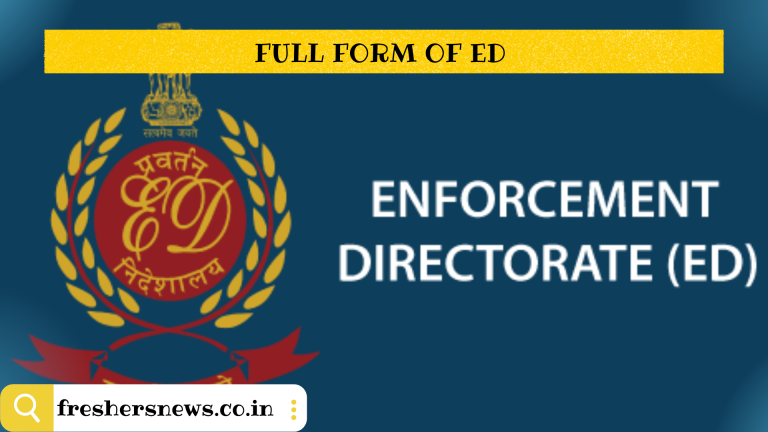The full form of ED is Enforcement Directorate. The Directorate of Enforcement was established in 1956, with its headquarters in New Delhi. It implements the specific provisions of the Prevention of Money Laundering Act and the Foreign Exchange Management Act of 1999 (FEMA). The Enforcement Directorate has been responsible for investigating and prosecuting violations of the PML.
The full form of ED is Enforcement Directorate.
The Directorate reports to the Department of Revenue for administrative purposes; however, the Department of Economic Affairs is responsible for the policy aspects of FEMA, its legislation, and any amendments thereto. However, the Department of Revenue is responsible for all PML Act policy matters. Prior to the implementation of FEMA on June 1, 2000, the Directorate enforced the Foreign Exchange Regulation Act of 1973.
Shri Sudhir Nath, an officer with the rank of Additional Special, is the Director. Two Special Directors are located at Headquarters, while one is in Mumbai. Each of the Directorate’s 10 Zonal offices and 11 sub-Zonal offices are managed by a Deputy Director and an Assistant Director, respectively.
Mumbai, Delhi, Chennai, Kolkata, Chandigarh, Lucknow, Cochin, Ahmedabad, Bangalore, and Hyderabad are “zones.” Sub-zonal offices include Jaipur, Jalandhar, Srinagar, Varanasi, Guwahati, Calicut, Indore, Nagpur, Patna, Bhubaneshwar, and Madurai.
The full form of ED is Enforcement Directorate.
Functions
- Intelligence inputs are obtained from various sources, including Central and State Intelligence agencies, complaints, etc., to collect, produce, and disseminate intelligence pertinent to violations of FEMA, 1999.
- Investigate potential violations of the FEMA 1999 regulations, including “hawala” foreign exchange extortion, failure to realize export proceeds, and failure to repatriate foreign currency, among others.
- Determine if violations of the former FERA, 1973, and FEMA, 1999 have occurred.
- To comprehend the effects of the penalties imposed by the adjudication processes.
- To administer prosecution, appeals, and adjudication proceedings under the previous FERA, 1973.
- Process cases for preventive detention under the Conservation of Foreign Exchange and Prevention of Smuggling Act and recommend their imprisonment (COFEPOSA).
- To investigate, search, seize, apprehend, and prosecute a PMLA violator, etc.
- To offer and request legal assistance from other contracting states regarding the attachment/confiscation of criminal proceeds and the transfer of accused individuals under the PMLA.
Principal goals of ED
- The primary objective of the ED is to enforce two major Indian government statutes, namely the FEMA 1999 (Foreign Exchange Management Act) and the PMLA 2002 (Money Laundering Prevention Act); the ED’s official website lists many other objectives that are directly related to combating money laundering in India.
- It is an investigative body, and the GOI prohibits disseminating all information to the public.
Administration of ED
- The intelligence reports come from various sources, such as the State and Intelligence departments, complaints, etc., to collect, establish, and disseminate information regarding 1999 FEMA violations.
- We are examining alleged violations of the 1999 FEMA regulations, such as hawala foreign exchange extortion, non-realization of export proceeds, non-repatriation of international trade proceeds, and other FEMA violations 1999.
- Cases of former FERA 1973 and FEMA 1999 violations are adjudicated.
- To administer the penalties imposed following the adjudication procedure.
- The management of appeals, appeals, and legal proceedings under the former FERA 1973.
- To conduct PMLA-related investigations, inquiries, inspections, convictions, and legal actions against suspects.
The full form of ED is Enforcement Directorate.
How Does ED Function?
The Enforcement Directorate (ED) operates in India to enforce economic laws and combat financial offenses. These operations involve investigation, prosecution, seizure, and forfeiture of assets and cooperation with other law enforcement agencies in India and abroad.
Investigation: ED investigations are typically initiated by complaints, intelligence inputs, or other information sources. After registering a case, the agency accumulates and analyzes evidence, conducts interviews, and interrogates suspects to construct a solid case. ED also employs data analytics and technology to investigate financial transactions and monitor the flow of funds. These operations are conducted by a team of trained investigators, forensic accountants, and legal professionals.
After the investigation, ED may submit a charging document to the court and prosecute the accused. ED has the authority to initiate confiscation proceedings for illegally acquired property. Additionally, the agency collaborates closely with public prosecutors and other law enforcement agencies to ensure that those who have committed crimes are brought to justice.
The full form of ED is Enforcement Directorate.
Seizure and forfeiture of assets: The ED has the authority to seize and confiscate assets suspected of criminal proceeds. The agency has the authority to seize properties, bank accounts, and other assets believed to have been acquired illegally. ED may also initiate confiscation proceedings against these assets.
Collaboration with other law enforcement agencies: The ED collaborates closely with other law enforcement agencies in India and abroad to collect evidence and information. The agency investigates economic crimes with the Central Bureau of Investigation (CBI), the Income Tax Department, and other agencies. ED collaborates with international organizations such as Interpol and the Financial Action Task Force (FATF) to investigate and prosecute transnational financial offenses.
Overall, ED’s operations involve a multifaceted approach to investigating and prosecuting economic crimes, emphasizing amassing solid evidence, suspending and seizing assets, and collaborating with other law enforcement agencies in India and abroad.
Conclusion
The full form of ED is Enforcement Directorate.
The Enforcement Directorate, also known as ED, is an Indian law enforcement agency established in 1956 to enforce economic laws and combat financial offenses. ED is tasked with investigating money laundering, foreign exchange violations, and other economic crimes on behalf of the Ministry of Finance. The agency is renowned for its rigorous and thorough approach to investigating financial crimes and has played a significant role in combating economic offenses in India. This essay will examine the acronym ED and provide an overview of the agency’s mission and responsibilities.

